PRINCETON, NJ -- Americans' views of eight important Mideast countries were fairly stable over the past year, after a decade that saw shifts in several of their ratings. Roughly seven in 10 Americans continue to view Israel favorably -- making it by far the most positively reviewed Mideast country of those Gallup tested. Just under half view Egypt and a third view Saudi Arabia favorably, while less than 20% have a favorable view of the remaining five, including Libya, the Palestinian Territories, Iraq, Syria, and Iran.
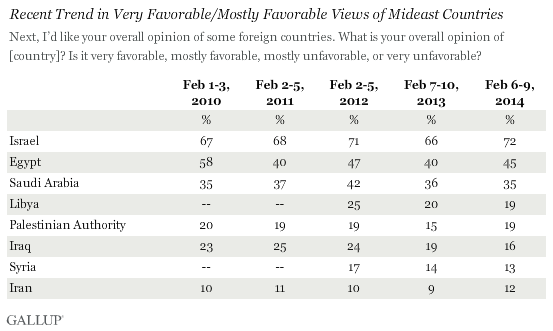
Positive views of Israel, Egypt, and the Palestinian Territories are up slightly from 2013; however, the shifts are not statistically significant and, in any case, current attitudes are similar to those found in 2012.
These results are based on Gallup's 2014 World Affairs poll, conducted Feb. 6-9. Gallup's annual World Affairs poll measures Americans' views on a variety of foreign policy issues, as well as the favorable and unfavorable images of a number of countries. The poll was initiated in 2001 and is updated each February.
At 13%, Syria's minimal U.S. favorable rating is similar to what it was a year ago, but down slightly from 2012, continuing a gradual slide in that country's image since 2005.
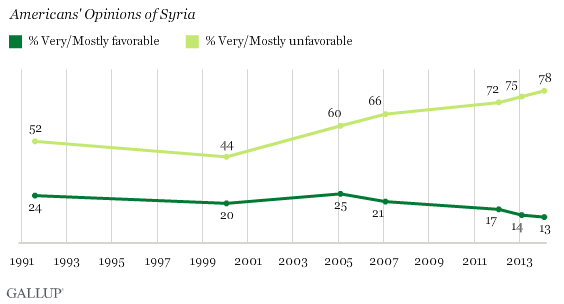
As the U.S. and other world powers are engaged in high-level talks with Iran over its nuclear program, Gallup finds little change in the overall percentage viewing Iran favorably, remaining near 85%. However, there has been some decline in the percentage viewing Iran very unfavorably, now at 42%, down from 52% in 2012.
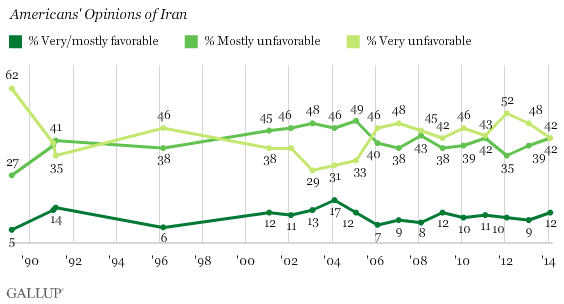
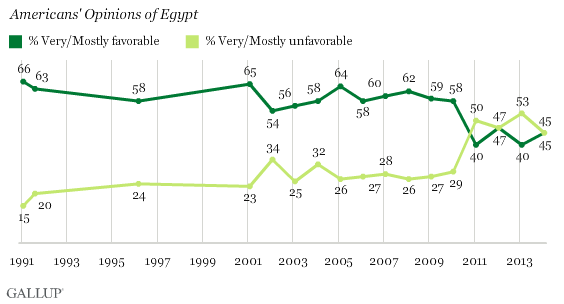
Americans' favorability toward Iraq has been gradually sinking since it hit a recent high in 2009, immediately after Iraqi governorate elections, and just two months after President George W. Bush signed a status-of-forces agreement that laid out a timeline for the withdrawal of U.S. forces. However, as with Libya, views continue to be more positive after the landmark event in the U.S.-Iraq relationship, which was the start of the U.S. invasion of Iraq.
Older Americans More Partial to IsraelThe poll reveals modest generational differences in how the Mideast countries are viewed. Gallup finds young adults, those aged 18 to 34, holding somewhat more positive views of several of the Arab countries than do adults 55 and older. This applies to Libya, Egypt, Iran, Syria, Iraq, and the Palestinian Territories. At the same time, older Americans have more favorable views of Israel, while there is no difference by age in views of Saudi Arabia.
The two countries, Libya and Egypt, that experienced successful Arab Spring revolutions -- inspired in part by frustrated young adults -- are most likely to receive positive evaluations from the youngest Americans. In particular, Egypt, which has seen massive youth-led protests even after the Arab Spring and as recently as July of last year that helped force President Mohamed Morsi from power, is most favorably viewed by 18- to 34-year-old adults.
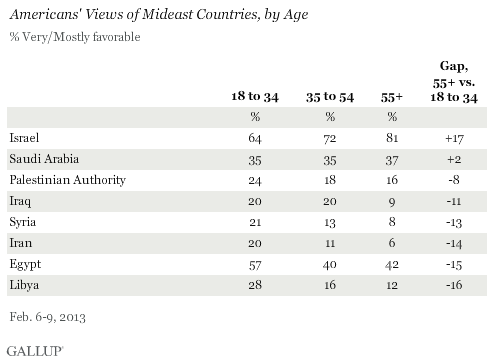
Bottom Line
Events in the Middle East often trigger modest to significant changes in how Americans view the various countries. By the same token, a year absent major political or military incidents on the scale of the Arab Spring, the Iraq war, or the Benghazi incident produces stability in U.S. attitudes, as seen this past year. Gallup's 2014 World Affairs survey finds no significant changes in the mostly positive image Israel enjoys among Americans, or in the more negative images of several of the major Arab countries.
As is typical, Gallup finds some generational differences in the country ratings. The greatest of these is toward Israel -- with adults 55 and older more positive by 17 percentage points than young Americans. The gap by age is nearly as wide for Libya, however, with young adults the more positive of the two groups.
Survey Methods
Results for this Gallup poll are based on telephone interviews conducted Feb. 6-9, 2014, with a random sample of 1,023 adults, aged 18 and older, living in all 50 U.S. states and the District of Columbia.
For results based on the total sample of national adults, the margin of sampling error is ±4 percentage points at the 95% confidence level.
Interviews are conducted with respondents on landline telephones and cellular phones, with interviews conducted in Spanish for respondents who are primarily Spanish-speaking. Each sample of national adults includes a minimum quota of 50% cellphone respondents and 50% landline respondents, with additional minimum quotas by time zone within region. Landline telephone and cellphone numbers are selected using random-digit-dial methods. Landline respondents are chosen at random within each household on the basis of which member had the most recent birthday.
Samples are weighted to correct for unequal selection probability, nonresponse, and double coverage of landline and cell users in the two sampling frames. They are also weighted to match the national demographics of gender, age, race, Hispanic ethnicity, education, region, population density, and phone status (cellphone only/landline only/both, cellphone mostly, and having an unlisted landline number). Demographic weighting targets are based on the most recent Current Population Survey figures for the aged 18 and older U.S. population. Phone status targets are based on the most recent National Health Interview Survey. Population density targets are based on the most recent U.S. census. All reported margins of sampling error include the computed design effects for weighting.
In addition to sampling error, question wording and practical difficulties in conducting surveys can introduce error or bias into the findings of public opinion polls.
View methodology, full question results, and trend data.
For more details on Gallup's polling methodology, visit www.gallup.com.
